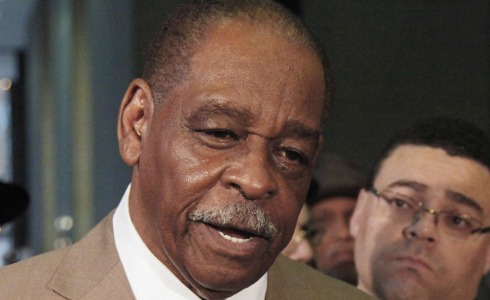
Race became an issue Tuesday at the tax-evasion trial of an influential Cook County commissioner, after the defense complained there were no black men in an initial jury pool and asked for it to be dismissed.
William Beavers, who is black, has pleaded not guilty to diverting more than $225,000 from campaign funds to feed a gambling habit and for other personal use without reporting it from 2006 through 2008.
Just after an initial pool of 50 would-be jurors took an oath early Tuesday afternoon and left the federal courtroom in Chicago, defense attorney Victor Henderson rose to note the absence of black men among them.
“To our astonishment, there is not one African-American male … and only a few black women,” he said. Beavers, 78, has a right to be judged by a jury of his peers, including black men, Henderson added.
Outside court later, another defense attorney, Sam Adam Sr., went further, saying he had never seen a jury pool without at least one African-American male in his more than 50 years practicing in federal court.
“This is outrageous,” he told reporters. “It could not happen by accident. This is all rigged someplace.”
Afterward, a spokesman for the U.S. Attorney’s Office in Chicago declined comment.
A jury office at the federal courthouse that operates independently from the U.S. Attorney’s Office is responsible for selecting the jury pool. It uses electronic systems to randomly select prospective jurors from voter-registration and driver’s license lists.
Statistical anomalies aren’t unheard of. At former Gov. Rod Blagojevich’s second corruption in 2011, there were far more women in the jury pool than men — and the jury ended up being all female. Blagojevich was eventually convicted on multiple corruption counts and is currently serving a 14-year prison sentence.
But given Chicago’s demographics, Henderson argued in court earlier Tuesday that randomness should have led, at a minimum, to three black men and three black women in the 50-person pool.
Judge James Zagel agreed it was unusual to not have a single black man in such a pool. He delayed a final ruling on the matter but also made it clear he was highly unlikely to agree to dismiss the entire jury pool.
Jury-pool selection is supposed to be random, and Zagel told attorneys they could take time to investigate jury-office selection procedures to ensure it was random in Beavers’ case.
But he said it was entirely plausible a randomly selected pool would include no black men. If it’s found the process was done correctly, he said, he would have no authority to dismiss the pool based on race.
Adam said later that Beavers’ legal team was resigned to the pool remaining intact.
“We have no option. … We have to go ahead,” he said.
Before adjourning in the evening, Zagel said he’d push ahead on questioning prospective jurors after questioning 24 Tuesday; his goal was to question the remaining 26 on Wednesday, then proceed to opening arguments Wednesday afternoon.
By federal law, courts and attorneys during jury selection are barred from objecting to individual jurors based on race — though courtroom adversaries often accuse each other of doing that.
It is rarer for attorneys to object to the jury pool itself as jury selection begins, as in this case, and before the court even questioned would-be jurors one by one.
While the case otherwise focuses on dry tax issues, it has attracted so much attention, in part, from the prospect that the old school politician with his shoot-from-the-hip swagger might testify.
Beavers is known for crude if memorable rhetorical flourishes, the most famous of which came when he once offered a favorable estimation of his own prowess, calling himself “a hog with big nuts.”
His lawyers have argued his is essentially a case of no harm, no foul — that he paid back the money at issue and amended his returns, albeit after he learned he was under investigation in 2009.
In all, Beavers has pleaded not guilty to four tax counts. If convicted, he faces a maximum three-year prison term on each count.